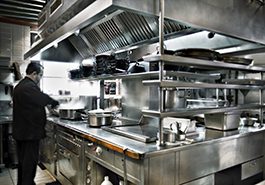By: Dan Galos, CWCA, AFIS, SBCS, Sales Executive / Risk Advisory Solutions
As someone that has tried my hand (and often failed) at home-brewing, I can attest to how difficult and messy trying to use a tiny home kitchen can be for large scale projects. Even those of us that prepare big holiday feasts know the struggle of not having enough space to work or storage capacity.
Add to this the large size and high cost of commercial-grade ovens, mixers, freezers, etc., and it’s easy to see how growth of a home-based food company can be stifled in its early stages. Furthermore, the FDA regulates certain aspects of making and selling food from home based businesses. For example, all food sales must be made from a licensed facility. Therefore, things like licensing, sanitation, labeling, recordkeeping, good manufacturing practices (GMPs), etc. all need to be factored into your plan.
Shared or co-op kitchens have been around for many years, but recently there has been a surge in the number of available facilities. Between 2013 and 2016, the number of commercial kitchen incubators increased by more than 50% to over 200 facilities. Many big cities have shared kitchen space or “food incubator” organizations that cater to small and startup businesses. Big food companies have gotten involved in this space as well with companies like Pepsi, Land O’Lakes and Chipotle (to name a few) offering kitchen space, education, and even funding to start-ups.
Finding a facility to work in is as easy as searching the internet for “shared kitchen” or “food incubator” and seeing what is available to you locally. Depending on what type of food you’ll be making, you will need to verify that the facility meets all of your requirements and has space and equipment you’ll need available. Most facilities will have a variety of options or plans to choose from. Make sure to shop around to find the facility that best fits your needs and budget. Cost structure can vary greatly, too. You can find kitchens that rent space by the hour or that have monthly or annual membership plans. These plans allow for a certain number of hours on-premise or unlimited access depending on the agreement terms.
Membership options usually take the form of different “tiers.” Higher-level tiers give access to the facility for more hours during the week or month with larger cooler, freezer, or dry storage space, private kitchen space, etc. Many organizations also offer educational classes, demonstrations, or access to industry experts to help answer questions related to different business topics.
Each facility will have an operating license, but it will require that your proof of your license as well. Check with your local Health Department to get the license and permit paperwork started. The shared kitchen facility will also require evidence of Commercial Insurance. This will help protect both you and the facility from liability arising out of the products you sell or damage to the facility. You may be asked to obtain General Liability, Property coverage, Workers’ Compensation, Cyber Liability and Auto coverage before you can even step foot on the premise. Working with an insurance expert that has experience in this area is essential as many factors affect insurance pricing, especially in the food industry. There are a few insurance carriers that have programs built specifically for companies working in shared spaces. The Horton Group’s Food Practice has partnered with Chicago-based food incubator,The Hatchery, and has helped many food company startups navigate this portion of their business.
Utilizing the services of a shared kitchen may be the best first step in realizing your dreams of becoming a food entrepreneur. As with anything, make sure to do your research before making any decisions. Have a detailed business plan and operating budget, and see what facilities align with your short and long-term goals. Check with state and local authorities to make sure you’re well informed about regulations governing the product(s) you want to make. Consult with your attorney to make sure you meet all legal requirements for your business and check with your insurance expert to confirm that you have the correct coverages in place. Now you’re ready to roll up your sleeves and get cooking!
Material posted on this website is for informational purposes only and does not constitute a legal opinion or medical advice. Contact your legal representative or medical professional for information specific to your legal or medical needs.



